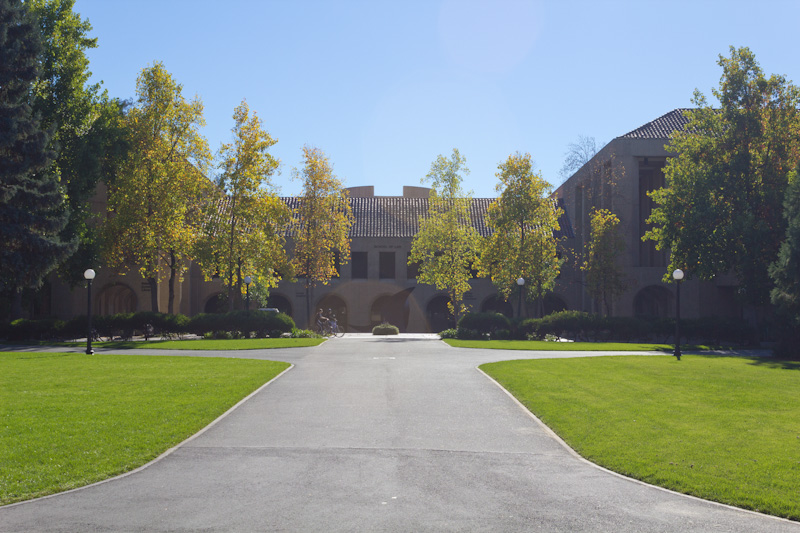Following Stanford Law incident at Federalist Society event, associate DEI dean leaves role

In a more recent communication with the Stanford Law School community, Jenny Martinez, dean of the law school, wrote that she hopes that they can move forward from a March incident involving an associate dean and a judge at a campus event. Photo by King of Hearts, CC-BY-SA-3.0, via Wikimedia Commons.
Tirien Steinbach, an associate dean at Stanford Law School who was shown in a videotaped campus exchange with a federal appellate judge that went viral, has announced that she is leaving her role.
The March incident happened at a campus event with the Federalist Society, where the guest speaker was Judge Stuart Kyle Duncan of the 5th U.S. Circuit Court of Appeals at New Orleans. A video shows members of the audience shouting at Duncan, as well as remarks from Steinbach, the law school’s associate dean for diversity, equity and inclusion.
While in private practice, Duncan’s clients included a Virginia school board that prohibited a transgender student from using boys’ bathrooms on campus. And as a 5th Circuit judge, he wrote for the majority in United States v. Varner, a 2020 opinion that denied a transgender federal inmate’s request for a name change and to be addressed with female pronouns.
Duncan and Steinbach wrote opinion pieces about the incident for the Wall Street Journal.
In his opinion piece, Duncan wrote that he asked for an administrator because the heckling would not stop. The video shows Steinbach, who is Black, telling him that she is an associate dean.
“You just asked for an administrator, and I am here,” she said.
She is also shown addressing the audience. Among her remarks, Steinbach said Duncan’s work as a lawyer and a judge “land as absolute disenfranchisement” of the rights of people in the Stanford Law community. Additionally, she said, for many people at the event, Duncan’s work caused harm.
Steinbach addressed the situation in a recent statement, shared with the ABA Journal by David Lowe, a partner at the San Francisco plaintiff employment firm Rudy Exelrod Zieff & Lowe.
“The honor I feel to have held this role and to have helped advance greater belonging, diversity, equity and inclusion for all members of the SLS community is undiminished by the circumstances surrounding the event with Judge Duncan,” Steinbach wrote.
Steinbach has been on leave from the university, according to Jenny Martinez, dean of the law school, in a March 22 letter. It also noted that Martinez had apologized to Duncan and outlined the university position that while protest was allowed on campus, disruption was not.
In a more recent communication with the Stanford Law community, Martinez wrote that she hopes that they can move forward. It was shared with the Journal by the law school’s senior corporate communications counselor.
“As I previously noted, tempers flared along multiple dimensions. Although Associate Dean Steinbach intended to de-escalate the tense situation when she spoke at the March 9 event, she recognizes that the impact of her statements was not as she hoped or intended,” according to the communication.
Martinez also wrote that the university and Steinbach recognized that the “very challenging situation” could have been handled better, including preparing for protests, making sure that university protocols are understood, and helping administrators navigate tensions when they arise.
Martinez’s communication was also shared in a July 20 social media post by Alex Morey, director of campus rights advocacy for the Foundation for Individual Rights and Expression, known as FIRE.
In a subsequent statement from Morey emailed to the media, she described the situation as “the Stanford Law shoutdown,” which she claimed that Steinbach facilitated.
According to Steinbach’s statement about her employment transition, she thinks that legal training taught her to “think and speak ‘either/or,’” but she has learned that the answers to important questions involve the phrase “both/and.”
“‘Both/and’ can be uncomfortable or frustrating when seeking clarity and direction, yet for those committed to principles of diversity, equity and inclusion—to creating communities where all people see and feel that they belong—‘both/and’ is not only helpful, it is necessary,” according to the statement.
See also:
ABAJournal.com: “Stanford Law’s Black Law Students Association pulls out of recruiting activities after Federalist Society event”
ABAJournal.com: “Law schools face an inflection point with diversity, equity and inclusion”
Write a letter to the editor, share a story tip or update, or report an error.


